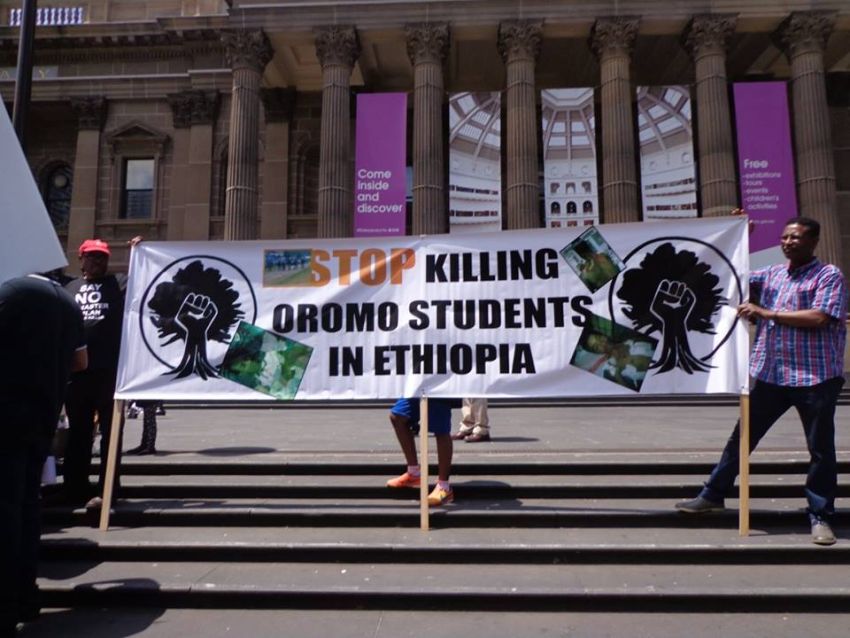
Melbourne's Oromo community rallied on January 3 as part of a world-wide action in solidarity with the Oromo student protesters currently leading the #OromoProtests movement in Oromia, Ethiopia.
The Oromo people are an ethnic group inhabiting Ethiopia, northern Kenya, and parts of Somalia. Oromia is Ethiopia's largest region, surrounding Addis Ababa. With around 25 million members, they constitute the single largest ethnicity in Ethiopia with about 35% of Ethiopia's population according to the 2007 census.
The protesters in Oromia say they fear cultural persecution and the loss of their land if the Ethiopian government's so-called "master plan" to integrate parts of Oromia into Addis Ababa go ahead. They also call for the Oromo people's right to self-development, self-determination and to publicly protest.
For well over a month, peaceful protesters have been met with government-directed military forces that are killing, beating and arresting primary school, high school, and university students for protesting.
The #OromoProtests movement has brought attention to the many illegalities and crimes against humanity the Ethiopian government has committed. In the face of extreme violence, mass arrests and a rising death toll, the protests continue and the protesters remain unarmed, peaceful and persistent.
The BBC reported on December 28 that at least five people had been killed in clashes in Oromia region in recent weeks and two journalists have been arrested.
The Guardian reported on December 11 that at least 10 students are believed to have been killed and hundreds injured during protests against the Ethiopian government's plans to expand the capital city into surrounding farmland.
By January 4 #OromoProtests was reporting that the death toll had reached 124 as disturbing reports of soldiers using hand grenades against the protesters emerged.
Rights groups say the Oromo have been systematically marginalised and persecuted for the last 24 years. Some estimates put the number of Oromo political prisoners in Ethiopia as high as 20,000 as of March 2014.
For campaign updates visit their website. A speech by Tsegaye R Ararssa can be read below the photos.
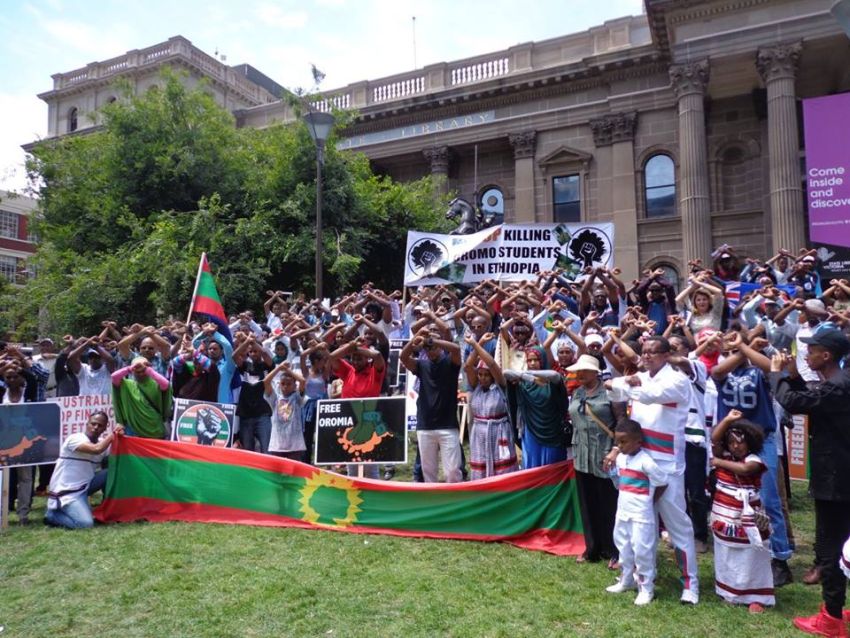
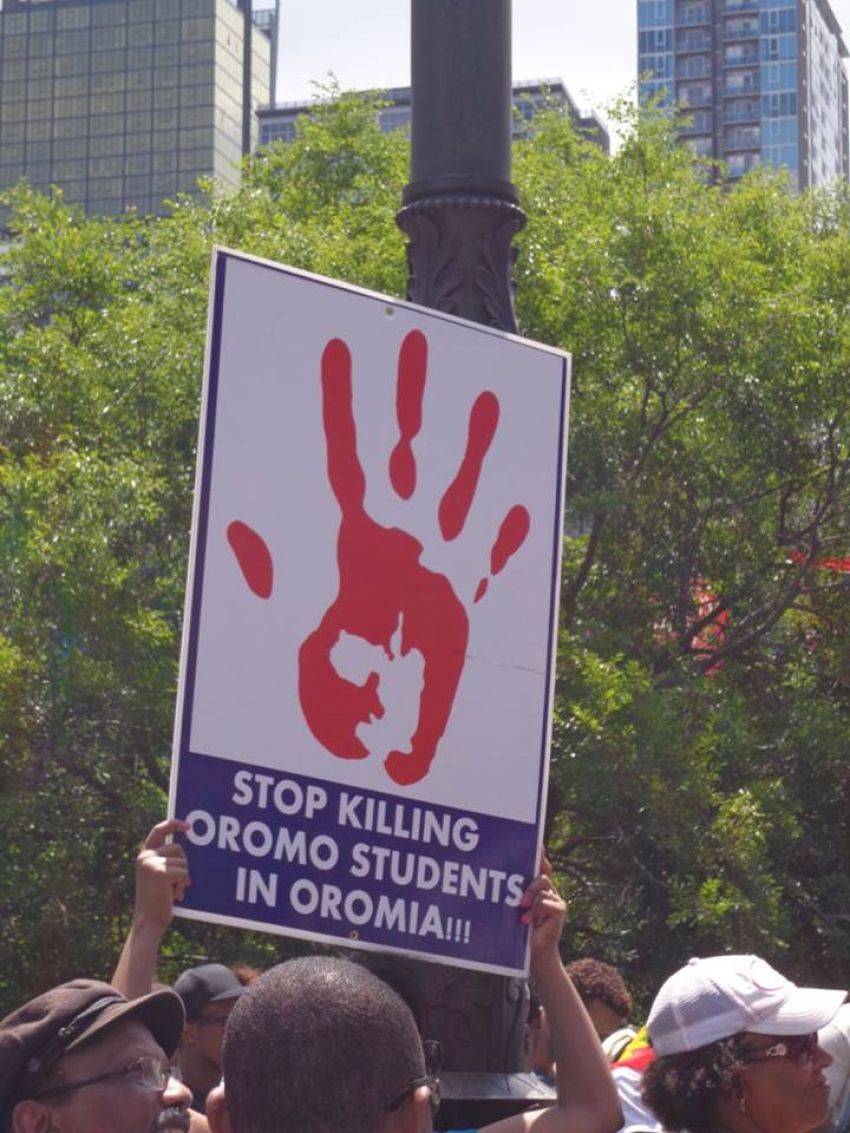
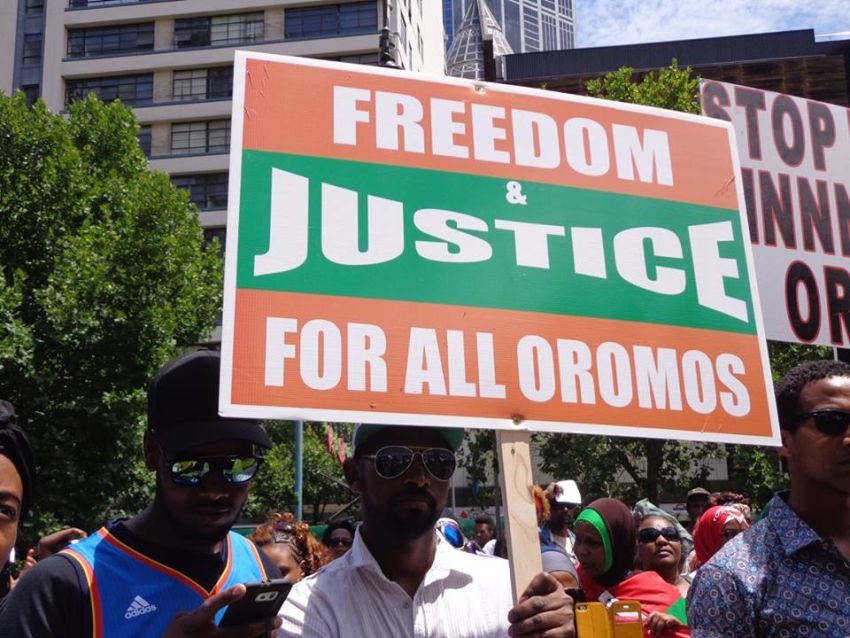
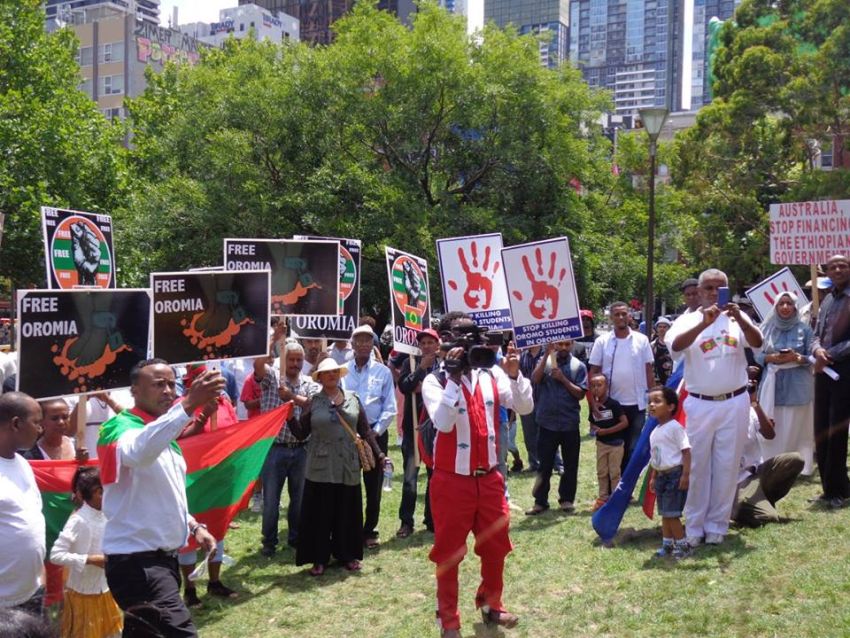
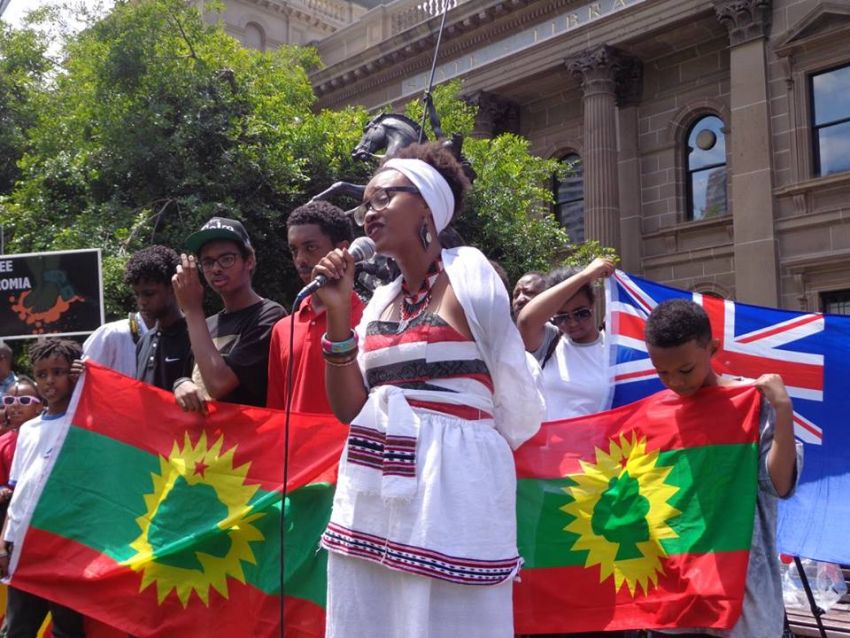
* * *
Tsegaye R Ararssa spoke at the Melbourne rally:
My name is Tsegaye Ararssa. I am an Oromo from Ethiopia. I come from Addis Ababa, and I intimately know the area that is directly affected by the Master Plan.
I am also one of the keen observers of the tragic events that are unfolding in our homeland today.
I am here as a concerned citizen who would like to join a chorus of voices that protest the ill-designed Master Plan, to denounce the killings and violent repressions being meted out by the regime, and to deplore the situation in which our people languish as we speak.
I am here to help us raise our voices as we tell stories of horror, stories of an impending humanitarian crisis in the Horn of Africa.
I would like to begin by saying 'thank you' to the organizers. What you have done today goes a long way as an expression of solidarity to the Oromo youth and farmers who are risking their lives, limbs, personal liberty, means of livelihood, etc, just so they can protest this deadly Master Plan.
What you have done today is significant in resisting the general land grab in Ethiopia.
It is immense in its impact in the effort towards arresting the humanitarian crisis facing the civilian Oromo population; and towards exposing the barbaric and atrocious acts of repression, killing, maiming, torture, rape and persecution of civilians as terrorists.
What you have done goes a long way to contest, resist and protest a wider practice of dispossession, displacement, and consequent homelessness/placelessness, and loss of identity, culture, and language.
What you have done today stands out as a noble act of resisting injustice in all its forms, to negate the Ethiopian state's practice of cultural dehumanisation, military subjugation, and political domination.
What you have done today is an important act to raise your voice against a massive act of state terrorism.
What you have done today goes a long way in exposing the state practice of political deception that fakes development for an outright plunder through dispossession.
This protest is an expression of solidarity with the Oromo protests at home and among the Oromo diaspora across the globe.
Ours is a voice of sympathy, because theirs is a voice of justice which we also take as our own.
Our protest is a demand for the respect for the human dignity of the Oromo person. It is a demand for equality and non-discrimination. It is a demand for social justice — housing, livelihood, health, employable labor, land and general human security.
It is a demand for a peaceful existence in one's place of birth. It is a demand for the ecological integrity of one's natural environment.
Above all, it is a demand for voice, a demand for a hearing. A demand to be taken seriously as a people.
For far too long, the Oromo have been silenced. For far too long, our image has been invisible. Our voice has been inaudible. Our perspective has been rendered unpalatable. Our message has been rendered unsayable.
For far too long, our cry has been a cry for help as in a scream in a dream.
This protest is a protest to say HEAR US. LISTEN TO US. SEE US. DON'T SEE THROUGH US. WE ARE HERE. AND WE AREN'T GOING ANYWHERE. THE LAND HAS A PEOPLE. THE LAND HAS A STORY. AND IT HAS A LIFE. IT IS NOT AN EMPTY SPACE. IT IS NOT TERRA NULLIS.
As a voice of justice, this is part of a global cry for justice only manifested as a local instance. This is the voice of humanity seeking a different — and a better — way of living this life.
Our protest is a challenge to the politics of deception, misinformation and brutal repression.
Our voice is the voice of the human cry expressed in all the international human rights instruments such as the Universal Declaration of Human Rights, the International Covenant on Civil and Political Rights and the International Covenant on Economic, Social, and Cultural Rights, and all other moral and legal codes of universal human aspirations.
Our voice is a voice calling for the respect of the constitution of the land. It is not an onerous demand at all. Ours is a critical voice of loyalty, a voice calling for constitutional fidelity. Ours is a demand for modest and honest politics grounded in the rule of law.
Ours is a voice of civilisation in the face of state barbarity. A voice of peace and legality in the face of state-sponsored terror, chaos and anarchy.
Ours is a voice calling for the fulfilment of the dreams of the ages, the aspiration for democracy in the Ethiopia yet to come. It is also a quest for self-determination in Ethiopia and beyond.
Most of all, ours is a voice of remembrance, a voice of remembering the dead and the disappeared. It is a voice of remembering them, bringing them back to live on, and to live with us.
We stand in solidarity with the Oromo protest as a voice of memory, a s a voice of a witness who has seen it all and has survived — if only to tell the story of horror.
As we tell these stories, we would also like to make a call to several fellow travellers of this humanist journey.
Ethiopians
We call upon all other peoples from Ethiopia to join the Oromo protests to help raise our voices against a shared experience of brutal repression by the State. We note the suffering of the peoples of Gambella, Afar, Benishangul-Gumuz, SNNPRS, and Amhara who had to sustain similar dispossession of land and displacement therefrom. We note all the unnecessary suffering created by the barbaric regime in Ethiopia today. We note the misery of the people of Qemant that resulted from misrecognition and is manipulated by the regime to spread hostility with the Amhara. We note the concerns of the people living in the Ethio-Sudanese border whose land is alleged to be gratuitously given over to the Sudanese government.
The Ethiopian Government
We reiterate our call to the government to:
- Scrap the Master Plan;
- Rescind the Caffee Law on Urban development in Oromia;
- Stop all other forms of land grab — such as the ones done through the creation of Industrial Zones, recreation parks, Investment Places, etc;
- Stop killing Oromo protesters;
- Withdraw the armed forces from Oromia which the latter have occupied without a Federal intervention Order or declaration of emergency and an appropriate legal response thereof;
- Restore displaced families to their land; compensate those who are displaced; provide replacement housing and means of livelihood that have so far been dislocated;
- Stop the political and military acts of state terror applied to the civilian population of Oromia;
- Release all the people arrested arbitrarily in the course of the protest now and in 2014;
- Release all Oromo prisoners of conscience such as Bekele Gerba; leaders of the OFC; Yonatan Tesfaye Regassa; and thousands of others;
- Call an emergency parliamentary meeting and establish an impartial, neutral (or, if that is impossible, all-inclusive) Commission of Inquiry to investigate the killings, injuries, mass arrests, disappearances, tortures and all forms of atrocities;
- Take political responsibility for the crisis and the lawless acts of state terror; Deplore the situation; express sympathy for the victims; apologize to the public; and ensure that perpetrators are brought to justice as appropriate;
- Dismiss the Caffee Oromia immediately and organize a snap election in Oromia so that a government with a genuine democratic mandate is put in place;
- Dismantle these illegal and unconstitutional bodies chaired by the Prime Minister such as the Command Post and the Joint Counter-terror Task Force;
- Renounce the de facto war declared on the Oromo people;
- Stop repressing the general Ethiopian public who express concerns over the anguish of the Oromo and all the other peoples of Ethiopia who are daily suffering from the brutal acts of state terror.
We call upon the government of Ethiopia to heed its own constitution and the provisions of international human rights instruments it has long ratified. We believe that doing this is in the interest of the regime itself, and with this protest we send our final appeal to the conscience, if any, of its officials.
Australians
We call on the Australian public to heed to the unfolding misery in the Horn of Africa country:
- Scrap the Master Plan;
- Rescind the Caffee Law on Urban development in Oromia;
- Stop all other forms of land grab — such as the ones done through the creation of Industrial Zones, recreation parks, Investment Places, etc;
- Stop killing Oromo protesters;
- Withdraw the armed forces from Oromia which the latter have occupied without a Federal intervention Order or declaration of emergency and an appropriate legal response thereof;
- Restore displaced families to their land; compensate those who are displaced; provide replacement housing and means of livelihood that have so far been dislocated;
- Stop the political and military acts of state terror applied to the civilian population of Oromia;
- Release all the people arrested arbitrarily in the course of the protest now and in 2014;
- Release all Oromo prisoners of conscience such as Bekele Gerba; leaders of the OFC; Yonatan Tesfaye Regassa; and thousands of others;
- Call an emergency parliamentary meeting and establish an impartial, neutral (or, if that is impossible, all-inclusive) Commission of Inquiry to investigate the killings, injuries, mass arrests, disappearances, tortures and all forms of atrocities;
- Take political responsibility for the crisis and the lawless acts of state terror; Deplore the situation; express sympathy for the victims; apologize to the public; and ensure that perpetrators are brought to justice as appropriate;
- Dismiss the Caffee Oromia immediately and organize a snap election in Oromia so that a government with a genuine democratic mandate is put in place;
- Dismantle these illegal and unconstitutional bodies chaired by the Prime Minister such as the Command Post and the Joint Counter-terror Task Force;
- Renounce the de facto war declared on the Oromo people;
- Stop repressing the general Ethiopian public who express concerns over the anguish of the Oromo and all the other peoples of Ethiopia who are daily suffering from the brutal acts of state terror.
We call on the government, its institutions of foreign policy, its institutions of human rights, and its civic organisations to engage with the regime in Ethiopia and put pressure on it to stop its acts of state terror, to renounce its land grab policies, and to start listening to the voice of the people. We call on Australia not only to demand Ethiopia to stop the ongoing atrocities but also to stop providing any support to it, be it diplomatic, financial, or otherwise.
The International Community
We call on the International Community and its institutions to take a heed to the plight of the Oromo people in Ethiopia and to take prompt and effective measures to arrest the mass atrocities unfolding in Ethiopia. We call on the international community to act morally, justly, and effectively before things degenerate into another genocidal scourge that happens right before our eyes.
We call upon everyone to stand in solidarity with Oromo protests and call for a stop to the murder of children and students in the name of eradicating “terrorists.”
As we do, we keep marching. We keep protesting. We keep resisting state violence. We resist a century old colonial violence that is being re-enacted in the form of the Master Plan.
We will keep saying No to the Master Plan. We say NO to injustice. We say NO to massive violations of human rights. We say NO to mass murder. We say NO to genocide. We say NO to Displacement. We say NO to continued and expanded state violence against the Oromo and all other oppressed peoples of Ethiopia. We say NO to arbitrary state demonization of the Oromo as “terrorists”.
We are Oromos seeking land justice; we are not terrorists. We are a voice of justice. We are a voice of remembrance. We are a voice of memory. We are a voice of human solidarity.